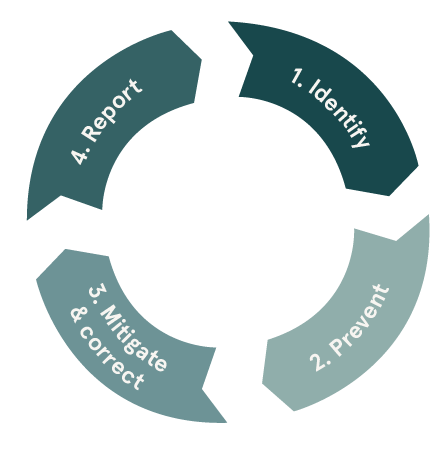Responsible supply chain

In Elopak, we have always had a strong focus on an ethical approach to our labor force, and we are extending this focus throughout our supply chain. In-house progress on these priorities is meaningless if achieved at the expense of others.
Making sure that we work with responsible and sustainable suppliers is crucial to reducing risk and avoiding negative impact throughout our supply chain on people, the environment, and society. It also helps us meet requirements and demands from customers, investors, and other stakeholders, that increasingly go beyond our operations and oppose/avoid social, environmental, and ethical breaches throughout our supply chains.
Approach
Elopak’s Responsible Supply Chain work follows a risk-based approach and is based on UN Guiding Principles and OECD framework.
Supplier Code of Conduct
We work with suppliers that meet our requirements and monitor their performance and compliance to assess and mitigate social and environmental risks in our supply chain.
Elopak global Supplier Code of Conduct sets forth our requirements and expectations in business ethics, human rights, labor practices, health and safety, and the environment. We expect all suppliers to comply with the code and have an equivalent code for their suppliers and sub-suppliers. It is an integral part of our supplier onboarding process and supplier contracts.
Supplier Assessments
As part of our process to ensure responsible and sustainable business practices in our supply chain, we perform supplier sustainability assessments with the support of a third-party service provider, Ecovadis, covering the supplier’s performance in the areas of Environment, Labor & Human Rights, Ethics, and Sustainable Procurement Practices.
Supplier selection for the assessments considers supplier criticality, country of origin, and industry.
We have also developed and started implementing a Supplier Integrity Due Diligence self-assessment questionnaire used for supplier onboarding and qualification purposes covering the supplier’s ability to meet our requirements and expectations.
Where suppliers do not meet our expectations, we work with them on corrective actions to better understand potential gaps and improvement areas. Re-assessments are conducted minimum bi-yearly depending on results of of the initial assessments.
If Elopak identifies or becomes aware of a non-compliance or high risk, we actively engage with suppliers to discuss and agree on mitigating activities and a clear timeline for following up the activities. If a supplier fails or shows an unwillingness to improve or remediate the gap and/or key risk, we evaluate what steps to take and appropriate contractual actions.

Performance
Targets
Ensure all key suppliers accept our Supplier Code of Conduct and are assessed for social responsibility and environmental criteria by 2025


KPIs | KPI reference |
a) % of raw material suppliers (by spend) signed, accepted or demontrated confomrance to Elopak Global Supplier Code of Conduct b) % of all suppliers (by spend) signed, accepted or demontrated conformance to Elopak Global Supplier Code of Conduct c) % of suppliers (by spend) assessed for environmental and social impact | Self-defined Self-defined GRI 308-2a GRI 414-2a |
Status 2021 | |
a) 100% b) 80% c) 73% |
Environmental and social responsibility is the backbone in the relations with our suppliers.
Tom Helge Egenes, Director Board Sourcing

Elopak had more than 4000 active suppliers in 2021. By 2021, suppliers accounting for 73% of total spend have been assessed using EcoVadis and/or Supplier Due diligence self-assessment questionnaires covering environmental and social criteria.
The suppliers that have been assessed are primarily key direct suppliers that provide raw materials for our cartons, packaging, filling machines as well as other key suppliers mainly related to logistics and transport, plants investments, IT, in addition to other indirect categories. We have also increased follow-up activities and corrective actions for suppliers with gaps and improvement areas identified in the assessments to secure continuous improvement and mitigate key risks.
Implementation of the updated Responsible Business Conduct requirements in our supplier contracts was initiated during 2021. From 2022 forward, our target is that all new or renegotiated contracts with key suppliers must include the updated requirements.
Our Global procurement Network have received training on our Responsible Supply Chain program during 2021.
Supply Chain Human Rights Risk Assessment
Elopak has a risk-based approach to supplier human rights due diligence. In 2021 we conducted a high-level human rights risk assessment of our supply chain, identifying our salient human rights risk issues and human rights due diligence priorities, allowing us to focus our resources and engagement more effectively. You can read more about the risk assessment and priorities here.
Moving forward
We are working to further embed human rights due diligence into our procurement processes and to continuously improve our Responsible Supply Chain procedure and framework.
We strive to improve the training program for all people involved in procurement processes and will improve engagement and effectively integrate responsible supply chain and sustainability considerations. We have also started working to develop nano-learnings and additional training material related to Responsible Supply chain and specifically on Human Rights risk assessment and due diligence in the supply chain that will be implemented in 2022/2023.
